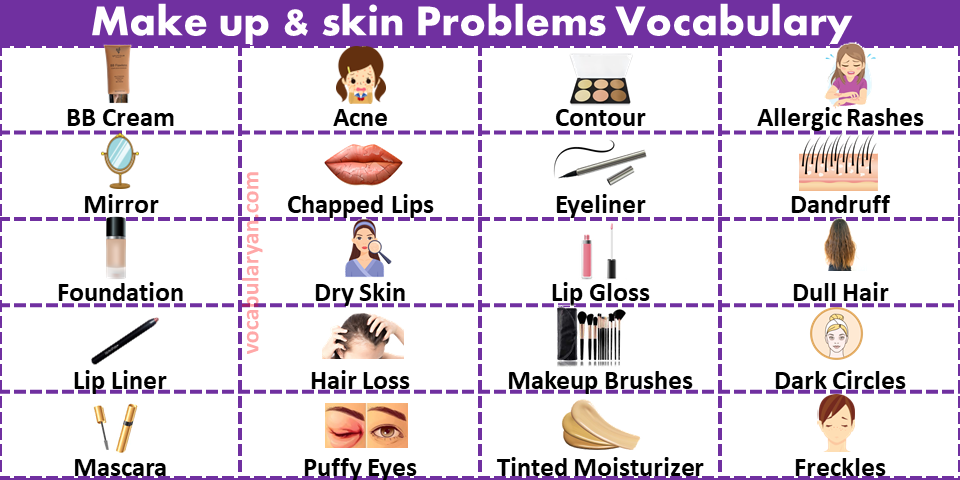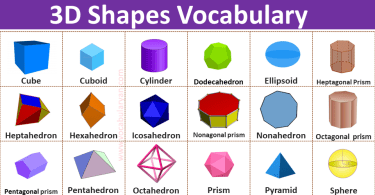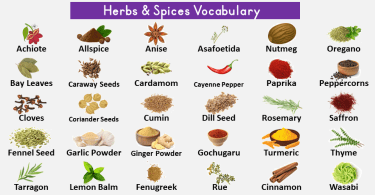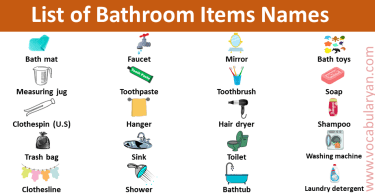Learning Makeup Vocabulary and Skin Problems helps improve vocabulary in health, beauty, and personal care topics. Terms like foundation, concealer, and mascara are commonly used in makeup routines, while words such as acne, wrinkles, and dark spots describe common skin issues. Additionally, knowing these words supports better understanding of product labels, beauty advice, and skincare instructions. Whether you’re a student, beauty learner, or English beginner, this guide offers simple and useful terms to talk clearly about appearance, skincare, and cosmetic use.
Makeup Vocabulary
Makeup items are products used to enhance or change a person’s appearance. Common items include foundation (for even skin tone), lipstick (for coloring lips), eyeliner (to define eyes), and blush (to add color to cheeks). Each item helps create a desired look.
Foundation – a makeup product used to even out the skin tone and provide a base for other makeup products.
Concealer – a makeup product used to hide blemishes, dark circles, and other imperfections on the skin.
Powder – a makeup product used to set foundation or concealer, and to reduce shine on the skin.
Blush – a makeup product used to add color to the cheeks and give a healthy glow to the face.
Highlighter – a makeup product used to add shine and accentuate the high points of the face, such as the cheekbones, brow bone, and bridge of the nose.
Bronzer – a makeup product used to add warmth and a sun-kissed glow to the skin.
Eyeliner – a makeup product used to define the eyes and create a variety of looks, from subtle to dramatic.
Mascara – a makeup product used to enhance the eyelashes and make them appear longer and fuller.
Eyeshadow – a makeup product used to add color and dimension to the eyelids, and to create a variety of eye looks.
Lipstick – a makeup product used to add color and moisture to the lips, and to create a variety of lip looks.
Lip liner – a makeup product used to define the lips and prevent lipstick from bleeding.
Setting spray – a makeup product used to set the makeup and prevent it from smudging or fading throughout the day.
Primer – a makeup product used to create a smooth, even surface for foundation and other makeup products to adhere to.
Contour – a makeup technique used to create the illusion of depth and dimension on the face, often using a darker shade of foundation or powder.
Setting powder – a powder used to set liquid or cream makeup products in place and prevent them from creasing or smudging.

Skin Problems
Skin problems are common conditions that affect the health and appearance of the skin. These include issues like acne, dryness, eczema, and rashes. Understanding these problems helps in finding the right treatment and maintaining healthy skin.
Acne – a skin condition characterized by the presence of pimples, blackheads, and/or whiteheads.
Wrinkles – fine lines or creases in the skin, often associated with aging.
Dryness – a lack of moisture in the skin, which can lead to flakiness, itching, and irritation.
Oily skin – an overproduction of oil by the skin, which can lead to a shiny, greasy appearance and clogged pores.
Dark circles – discoloration under the eyes, often caused by fatigue or genetics.
Fine lines – small wrinkles or creases in the skin, often associated with aging.
Dullness – a lack of radiance or glow in the skin, often caused by dehydration, lack of sleep, or stress.
Hyperpigmentation – an overproduction of melanin in the skin, which can lead to dark spots or patches.
Redness – inflammation or irritation in the skin, often associated with conditions like rosacea or eczema.
Puffiness – swelling or fluid retention in the skin, often associated with lack of sleep, allergies, or aging.
Uneven skin tone – skin that appears blotchy or mottled in color, often caused by sun damage or hormonal changes.
Ingrown hairs – hairs that grow back into the skin, often causing inflammation and redness.
Enlarged pores – pores that appear larger than normal, often caused by genetics or excess oil production.
Blackheads – small, dark bumps on the skin caused by clogged pores.
Whiteheads – small, white bumps on the skin caused by clogged pores.






Leave a Comment